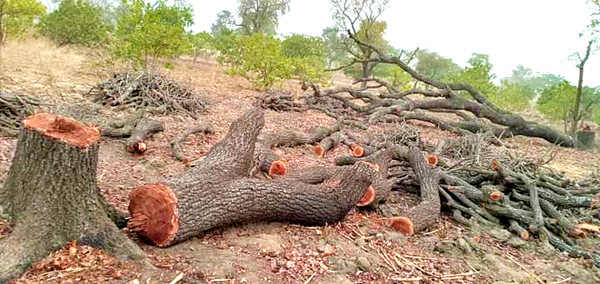Ghana News | Ghana Politics | Breaking News in Ghana

Massive destruction of shea trees in Upper West
One of the very popular adages in the Ghanaian society is that: “When the last tree dies, the last man dies.”
Ironically, its meaning is seldom put into use as some people continue to destroy trees indiscriminately.
Advertisement
Undoubtedly, trees are life dependents of mankind, and without them nobody can survive on the earth.
However, a growing phenomenon in which the wildly growing shea trees are harvested for firewood and charcoal is gaining notoriety in the Upper West Region.
The tree, which serves as a major source of livelihood to the rural population, particularly women, has come under attack in recent times in the area trees are felled indiscriminately to burn charcoal and for firewood.
The perpetrators who many refer to as ‘shea tree entrepreneurs’ are said to be feeding the growing demand of ‘pito’ brewers and other commercial users. The shea tree charcoal and firewood are said to be in high demand in the market in recent times because they last longer than charcoal and firewood from other species of trees.
Situation
Checks by the Daily Graphic revealed that large quantities of the economic trees had been destroyed in the forests in the region, with the Wa and Nandom municipalities being severely affected.
During a recent visit, it was observed that thousands of shea trees had been cut down and chopped into pieces for firewood, while others were packed in heaps for charcoal burning in the off-forests.
At the Kaabaah, Goziir-Segtang, Ko, Torkuu, Kparisaga and Piisi communities, all in the Wa and Nandom municipalities, the situation was very pathetic as some chainsaw operators and individuals were seen in the bush harvesting the trees and tricycles seen conveying the loads to town for sale.
In an interview with the Daily Graphic, the Assemblyman for the Sing Electoral Area, Mr Franklin Jerry, said the felling of economic trees had become a normal practice in the area as many people engaged in it with impunity without being punished.
He indicated that some rural women who depended on picking shea nuts for their livelihood and income were already bearing the brunt of the act as there had been dwindling shea picks.
Shea entrepreneurs
Aside from the shea trees, other economic tress such as ‘dawadawa’ and rosewood were also seen being felled in some areas. After virtually stripping the forest naked of its valuable economic trees such as rosewood and ‘dawadawa’, the perpetrators had now vented their anger on the shea trees, destroying a large number of them.
Besides the activities of the charcoal and firewood harvesters, the trees are also destroyed through bush fires, while some farmers also clear the economic trees to make way for the planting of other plants such as mangoes and cashew.
The Daily Graphic gathered that some middlemen now bought the trees from the landowners, felled and chopped them into firewood and sold to ‘pito’ brewers. The practice appeared to be very common in the Nandom municipality.
An Environmental Activist in the Upper West Region, Mr Gordon Eredoglo, who has been leading a crusade against the destruction of the forest in the area said “women and men, both old and young, are now competing for the few shea trees left to fell for charcoal and firewood. The farmers or landlords out of greed or ignorance continue the heinous act on the field”.
He called for more education and sensitisation of the general public, especially farmers, to the need to preserve and protect the few shea trees left, stating that the area might be hit with severe environmental challenges due to the rampant depletion of the forest.

Bags of charcoal in the bush made from felled shea trees
Alternative energy source
Though the Forest Protection (Amendment) Act, 2002 (Act 624) makes it an offence to fell or subject forest resources to any manufacturing process without the written consent of the competent forest authority, enforcing the act and protecting the environment has been very challenging because some people ride on the pretext of looking for energy for domestic purposes to destroy the environment.
The acting Upper West Regional Director of the Environmental Protection Agency (EPA), Mr Emmanuel Lignule, observed that the fight against forest destruction was very challenging because vv many people depended on charcoal and firewood for energy.
“Our general consumption rate of firewood and charcoal is very high and it is one of the reasons why the phenomenon is very rampant. Until we are able to find alternative energy sources, it will be very difficult to fight the menace,” he stated.
Climate change
Shea trees are the major vegetation cover in Northern Ghana, particularly in the Upper West Region with about 90 per cent coverage.
With the rampant destruction of the vegetation, many have raised concerns that if the menace is not immediately checked by authorities, the country would soon lose its already depleted vegetation, worsening climate change.
Climate change issues have become one of the concerns around the globe, especially in Africa and Ghana where there is massive destruction of forests by illegal loggers and charcoal burners.
“Of course, we will be emitting a lot of carbon dioxide into the atmosphere which eventually affects the climate. Trees absorb these carbons and so anytime we fell a tree, carbons are released into the atmosphere,” the Convener of the Green Republic Project,Nana Yaw Osei-Darkwa, said.
He has, therefore, called for stiffer punishment for perpetrators of such acts to send a strong signal to others, as well as a radical approach to restore the depleted vegetation cover.
Way forward
An estimated three million rural women in Ghana, particularly the Savannah Ecological Zone, make income from shea butter. The tree's ability to survive dry weather conditions makes it an attractive farming option in the Savannah Ecological Zone.
Export earnings from shea butter products are said to have reached US$64 million in 2015. In the past seven years, shea has been part of the top 10 leading non-traditional export products from the country.
There is, therefore, the need for authorities to put effective mechanism in place to preserve and adequately exploit the resource for poverty reduction and socio-economic development, as well as help fight climate change, especially in northern Ghana.





